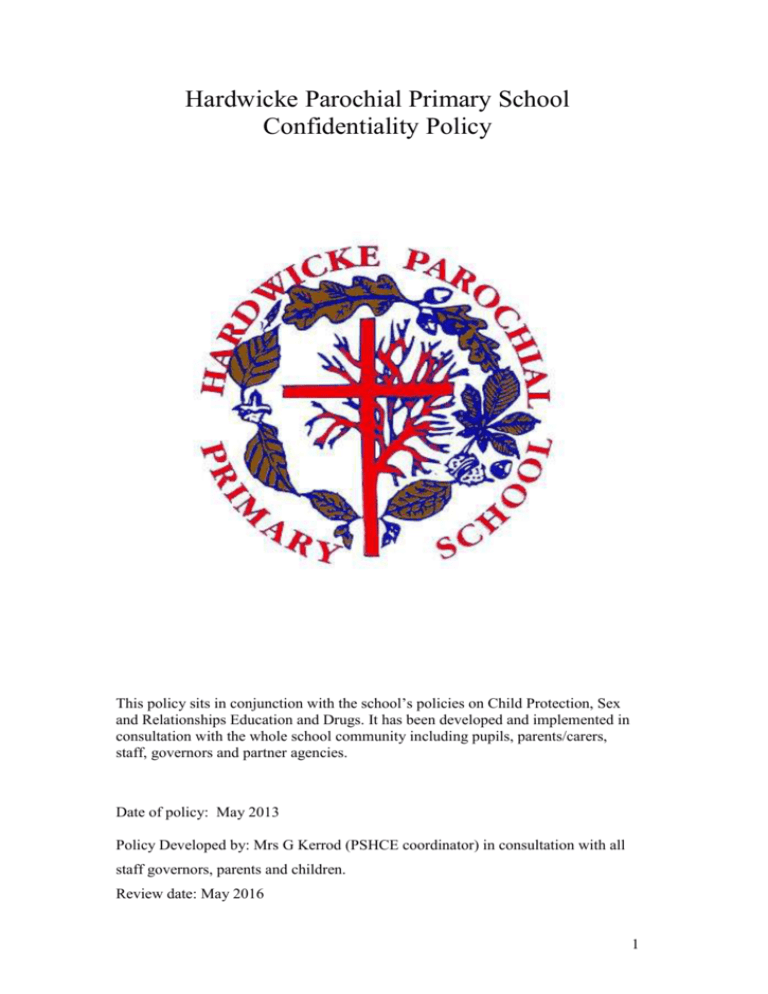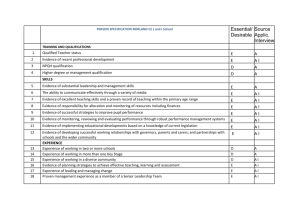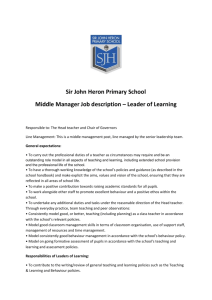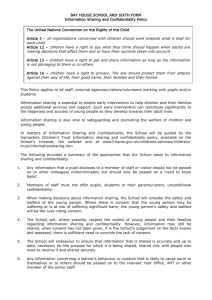Confidentiality policy - Hardwicke Parochial Primary School
advertisement

Hardwicke Parochial Primary School Confidentiality Policy This policy sits in conjunction with the school’s policies on Child Protection, Sex and Relationships Education and Drugs. It has been developed and implemented in consultation with the whole school community including pupils, parents/carers, staff, governors and partner agencies. Date of policy: May 2013 Policy Developed by: Mrs G Kerrod (PSHCE coordinator) in consultation with all staff governors, parents and children. Review date: May 2016 1 Aims: When teachers are working with children on personal, social and health education programmes, or in the teaching of any sensitive or controversial issue, it is possible that some children will want to discuss information that is of a personal nature, or may sometimes make disclosures about risky or illegal behaviour. This policy aims to set out guidelines for responding to such situations. Objectives: To ensure that staff, parents and pupils understand what will happen if these situations occur. To define ‘confidentiality’. To explain the implications of this for practice within the school. To ensure that all staff, pupils and parents understand what is meant by ‘confidentiality’ at Hardwicke School. To ensure that staff consider the issue of confidentiality when discussing the children in their care and incidents that may happen in school. Guidelines for practice: This policy is particularly relevant to the teaching on PSHCE, Drug Education and Sex Education. However, it also covers all situations both in and outside the classroom. ‘Ground Rules’ will be made explicit in lessons whenever appropriate. These should outline the following(in appropriate language): o We will respect each other’s views. o We will listen carefully to one another. o No put downs! o We don’t use names or talk about things that are very personal to us. If I (the teacher) think that someone has said something that makes me think that they are being hurt in someway or are not safe, I will talk to someone else about it. o Staff should not put pressure on pupils to disclose personal information and should discourage fellow pupils from applying any such pressure. 2 When the lesson is tackling a particularly sensitive matters such as, puberty, sex or drug education, we will add another rule which is that: ‘Whatever we talk about in this lesson will stay between us. No gossiping in the playground’. Following the guidance in our Child Protection Policy, where information is of a sensitive nature is disclosed, this must be treated seriously and with sensitivity. Under no circumstances must a promise be made that you will not tell anyone else. Explain that in order to help, you may need to talk to other people. If a child discloses information that indicates that they may be at risk of abuse, neglect or harm, you must seek further advice as indicated in our Child Protection Policy. In the following circumstances we will always break confidentiality: o Life and immediate risk o Prevention of terrorism o A third party is at risk of abuse or neglect o When you have been subpoenaed to a Court of Law Following a disclosure: o Agree with the child who you will talk to and what you will say o How you will continue to support them through the process o The member of staff should be able to discuss the issue with an appropriate colleague, to decide on suitable action, without giving the name of the pupil. ‘Confidentiality’ also refers to protecting the information we hold about the pupils in this school and their families. All staff and governors will endeavour to maintain confidentiality when appropriate, for example, by considering the conversations they have about pupils and their families, the purpose of these conversations and where these take place and disciplinary matters dealt with in accordance to the school’s own procedures and out of the eye of the wider community, It is important that: o Staff will not discuss details of individual cases arising in staff meetings to any person without direct professional connection to and interest in the welfare and education of the individual concerned. 3 o No member of staff discusses an individual child’s behaviour in the presence of another child in the school. o Staff will not enter into detailed discussion about a child’s behaviour with other children or parents. o Governors, in particular, those sitting on Discipline Committees, do not divulge details about individuals (be they staff, families or individual children) to any person outside of the meeting. o Parents in school, working as volunteers, or as part of the Parents and Friends Association are regarded as members of staff in relation to this policy and are covered by the terms of the policy in exactly the same way. In particular, parents should not report cases; through direct discussion or via the internet, of poor behaviour or pupil discipline to other parents in school. This allows the school to deal with such matters in line with school policy. o At full Governing body meetings matters such as pupil exclusion, personnel issues and personal details of any member of the school community will be dealt with in the Head Teacher’s Report under Part 2 confidential. This is not for the knowledge of persons outside the Governing body meeting. Minutes in part 2 are minuted separately and these are not published. o Staff performance management will be carried out privately. Targets for individuals, named lesson observation sheets and other performance data will be held in the head teacher’s office and electronic records will only be available from the head teacher’s computer. o Matters of Child Protection are made known to staff on a need to know basis. o It is important that class teachers and support staff are made aware of some confidential matters in order to support individuals. These staff will respect the sensitivity of such cases and not divulge information to people unconnected professionally with the individual concerned. o When volunteers, such as parents and friends of the school are working in classes, they do not discuss educational issues outside the classroom. For example, the specific use of teaching assistant time for particular pupils or groups of pupils, teaching assistants having different roles within a class, including the support of children with special educational needs, the 4 provision and work with these children is for the teacher to discuss with the relevant parents and carers. o Volunteers, students and supply teachers are asked to read this policy and sign an agreement to work within its requirements before working in school. Equal Opportunities Staff may wish to discuss an individual case with a class or group. For instance, it can support the inclusion of a child with Aspergers Syndrome or Autism, if their peers are made aware of the condition and have some idea of what to expect. Similarly a child with a visual impairment can be supported if his/her friends know how to look out for them in the playground. In such cases permission will be sought from the child and his/her carers. How we are meeting these objectives: All staff working at Hardwicke School will be made aware of the contents of this policy and the implications of it for their everyday practice. All parents will be made aware of this policy and its contents. All external agencies working in school to deliver elements of PSHCE will be made ware of this policy and its contents. When working with the whole class or groups of children, their practice will be covered by this policy. When working with individual children or their families, they will be bound by their own professional code of conduct and by negotiating ground rules and using distance techniques. . Date ratified: 5 Confidentiality Requirements Please read the conditions of confidentiality which are required at Hardwicke School. If you are happy to accept these conditions please sign the slip below. Failure to do this will mean that you will not be able to work/visit/volunteer in our school. If in breach of this policy, appropriate action will be taken by the school. Many thanks Mrs G Kerrod I (Name) ………………………………………………………………….. can confirm that I have read and understood all of the implications of the school’s Confidentiality Policy and agree to work within its requirements. Signed……………………………………………….Date………………………….. 6







